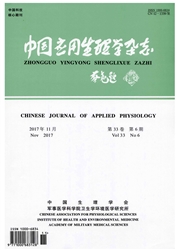

 中文摘要:
中文摘要:
目的:研究同型半胱氨酸(Hcy)对体外培养神经元的损伤作用及其相关机制。方法:用Hcy处理体外培养的海马和皮层神经元,观察神经元的凋亡情况,以及神经元内游离钙浓度改变、DNA损伤和氧化损伤。结果:用250μmol/LHcy作用4h可使神经元凋亡率显著升高,并呈时间依赖性。甲基供体S-腺苷蛋氨酸(SAM)可显著抑制Hcy引起的神经元凋亡。Hcy(250μmol/L)可使神经元内游离钙浓度显著升高;导致神经元的彗星率明显增高;使神经元内MDA的产生增多,但并不影响神经元的总抗氧化能力(T-AOC)。结论:高浓度Hcy可通过神经兴奋作用、DNA损伤和氧化损伤等多方面机制对神经元造成损伤作用,从而诱导神经元发生凋亡。DNA损伤在Hcy导致神经元凋亡的作用中起着关键作用。
 英文摘要:
英文摘要:
Aim:To observe the impairment of homocysteine(Hcy)on neurons in vitro and the related mechanismes.Methods:We examined the consequences of treatment of cultured rat cortical and hippocampal neurons with Hcy and detected the neurons' apoptosis,calcium influx,DNA damage and oxidative injury.Results:Primary cortical and hippocampal neurons were treated with Hcy(250 μmol/L)for 4 h resulted in apoptosis time-dependently.S-adenosyl methionine(SAM)could significantly,but MK-801,an NMDA receptor inhibitor,couldn't repress the Hcy induced neuron apoptosis.Hcy could induce neuron calcium overload through activating the NMDA receptors.The DNA of neurons was damaged by Hcy because the methylation reactions were inhibited.Hcy treatment also induced MDA level significantly increased,but did not affect the neurons' T-AOC.Conclusion:These findings indicate that Hcy compromises neuronal homeostasis by multiple,divergent routes,including DNA damage,neuron exitotoxicity,and oxidative injury.Hcy mediated neuron apoptosis was mainly due to DNA damage.
 同期刊论文项目
同期刊论文项目
 同项目期刊论文
同项目期刊论文
 期刊信息
期刊信息
